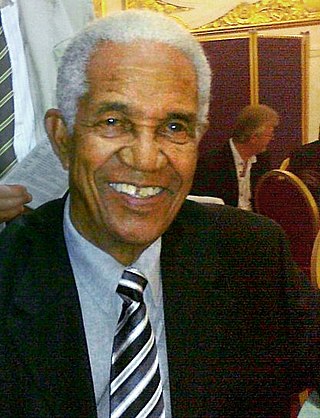
The Right Excellent Sir Garfield St Aubrun Sobers, NH, AO, OCC, also known as Sir Gary or Sir Garry Sobers, is a former Barbadian cricketer who played for the West Indies between 1954 and 1974. A highly skilled bowler, an aggressive batsman and an excellent fielder, he is widely considered to be cricket's greatest ever all-rounder and one of the greatest cricketers of all time.

Ravindranath Rampaul is a Trinidadian cricketer who plays as a pace bowler. He's played for the West Indies, Trinidad and Tobago and IPL side Royal Challengers Bangalore. Rampaul has also featured for CPL outfits Barbados Tridents and Trinbago Knight Riders along with English County cricket teams Surrey and Derbyshire. Rampaul was a notable member of the Windies side that won the 2012 T20 World Cup.
Sir Wesley Winfield Hall is a Barbadian former cricketer and politician. A tall, strong and powerfully built man, Hall was a genuine fast bowler and despite his very long run up, he was renowned for his ability to bowl long spells. Hall played 48 Test matches for the West Indies from 1958 to 1969. Hall's opening bowling partnership with fellow Barbadian Charlie Griffith was a feature of the strong West Indies teams throughout the 1960s. Hall was one of the most popular cricketers of his day and was especially popular in Australia, where he played two seasons in the Sheffield Shield with Queensland.

Sir Everton DeCourcy Weekes, KCMG, GCM, OBE was a cricketer from Barbados. A right-handed batsman, he was known as one of the hardest hitters in world cricket. Weekes holds the record for the most consecutive Test hundreds, with five. Along with Frank Worrell and Clyde Walcott, he formed what was known as "The Three Ws" of the West Indies cricket team. Weekes played in 48 Test matches for the West Indies cricket team from 1948 to 1958. Weekes occasionally donned the wicketkeeping gloves as well. He continued to play first-class cricket until 1964, surpassing 12,000 first-class runs in his final innings. As a coach he was in charge of the Canadian team at the 1979 Cricket World Cup, and he was also a commentator and international match referee.
Ian David Russell Bradshaw is a former Barbadian cricketer who played for the West Indies cricket team as a left-arm fast bowler. A former West Indies under-19s and Barbados captain, he was a notable member of the West Indies team that won the 2004 Champions Trophy, being named man of the match in the tournament's final, and scored the winning boundary. Bradshaw eventually picked up 78 wickets for the Windies at an average of 29.47 from 62 ODIs.
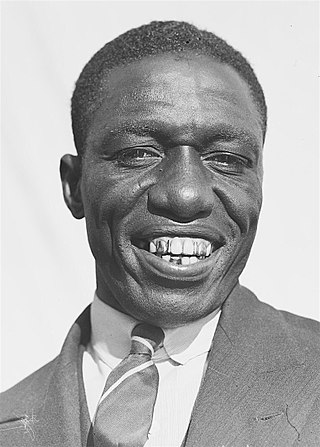
George Nathaniel Francis was a West Indian cricketer who played in West Indies' first Test in their inaugural Test tour of England. He was a fast bowler of renowned pace and was notably successful on West Indies' non-Test playing tour of England in 1923, but he was probably past his peak by the time the West Indies were elevated to Test status. He was born in Trents, St. James, Barbados and died at Black Rock, Saint Michael, also in Barbados.

Wilton H. St Hill was a West Indian international cricketer who played in West Indies' first Test match during their inaugural Test tour of England. A right-handed batman who played in a variety of batting positions, he represented Trinidad in first-class cricket between 1912 and 1930 and played in three Test matches in total. Although his Test record was poor, he was highly regarded in Trinidad. In particular, writer C. L. R. James considered St Hill to be among the top batsmen in the world and dedicated a chapter of Beyond a Boundary to him. At the peak of his career, Lord Harris described him as the best batsman in the West Indies.

Joseph A. Small was a West Indian cricketer who played in West Indies' first Test in their inaugural Test tour of England. He scored the first half century for a West Indies player in Test cricket and played two further Test matches in his career. An all-rounder, he played domestic cricket for Trinidad between 1909 and 1932.
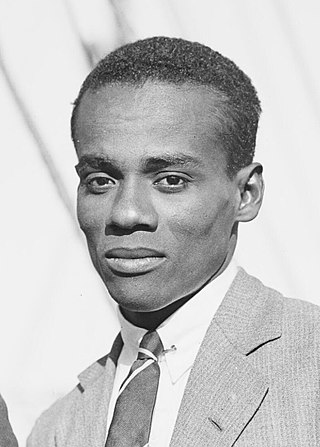
Edwin Lloyd St Hill was a Trinidadian cricketer who played two Test matches for the West Indies in 1930. His brothers, Wilton and Cyl, also played for Trinidad and Tobago; in addition, the former played Test matches for the West Indies.

Emmanuel Alfred Martindale was a West Indian cricketer who played in ten Test matches from 1933 to 1939. He was a right-arm fast bowler with a long run up; although not tall for a bowler of his type he bowled at a fast pace. With Learie Constantine, Martindale was one of the earliest in the long succession of Test-playing West Indian fast bowlers. During the time he played, the West Indies bowling attack depended largely on his success. Critics believe that his record and performances stand comparison with bowlers of greater reputation and longer careers.
Benjamin James Sealey or Sealy was a West Indian cricketer whose career spanned the years 1924 to 1941. He was an attacking, middle-order batsman, a medium-pace, leg-break bowler and an athletic fielder anywhere in the field. Despite once turning out for a "Barbados-born" side against the Rest of West Indies, Sealey was a Trinidad player through and through.
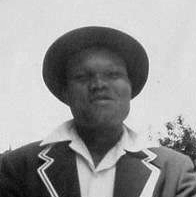
Wilfred Ferguson was a West Indian cricketer who played in eight Tests from 1947-48 to 1953–54. He played first-class cricket for Trinidad from 1943 to 1956.
Frank McDonald King was a West Indian cricketer who played in 14 Test matches between 1953 and 1956.
Sydney Gordon Smith was a cricketer who had three distinct careers, playing for Trinidad in the West Indies, for Northamptonshire in England and for Auckland in New Zealand. He also played for representative sides: for the West Indies side that toured England in 1906; for MCC sides that toured the West Indies in 1910–11 and 1912–13; and for New Zealand in matches against MCC and Australian sides.
The English cricket team in the West Indies in 1934–35 was a cricket touring party sent to the West Indies under the auspices of the Marylebone Cricket Club for a tour lasting 2+1⁄2 months in 1934–35. The team played four Test matches against the West Indian cricket team, winning one match but losing two – the first series defeat of an English side by the West Indies.
Clifford Everard Goodman, was a Barbadian cricketer of the 1890s.
A team of amateur cricketers under the captaincy of Arthur Priestley toured the West Indies in the 1896–97 season, playing matches between January and March 1897. They played a total of sixteen matches of which nine are regarded as first-class. They did not play in British Guiana.

William Thomas Burton was a coloured West Indian first-class cricketer best known as a member of the 1900 and 1906 West Indian tourists to England.

Richard Cordice Ollivierre was a black West Indian cricketer who toured England in 1906. He was a right-handed batsman, right-arm fast bowler and useful wicket-keeper.
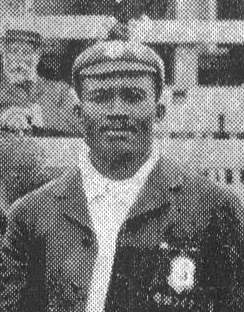
Oliver Hoffran Layne was a West Indian cricketer who toured England in 1906. He was a right-handed batsman and right arm medium pace bowler.












